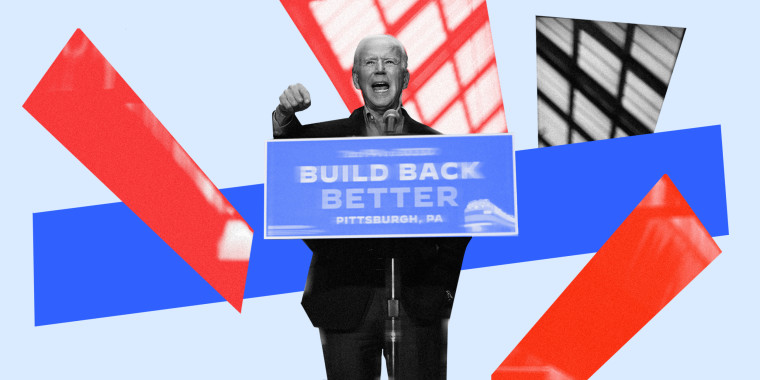America is falling apart at the seams. I don't mean that in a rhetorical sense or as a commentary on our politics. I mean the concrete and steel stitches that hold this continent of a country together have been threatening to snap for years. And it's about time we started talking about it seriously.
Every four years since 1998, the American Society of Civil Engineers has issued a report card for the country's various infrastructure sectors, judging the condition of its roads, dams and other public works. This year's report, issued March 4, gave the country a "C-minus" overall. But most of the categories were in the "D" range, which indicates that a "large portion of the system exhibits significant deterioration" and that many elements are "approaching the end of their service life."
Meanwhile, the only thing we have to show from former President Donald Trump's promises to focus on big-ticket shovel-ready projects are four years' worth of "Infrastructure Week" jokes. Instead, depending on how you count it, it's been somewhere between six and 10 years since Congress has passed a major infrastructure bill. Even those acts focused mainly on rebuilding highways, which has become the default idea of "infrastructure," to the detriment of public works like improving access to water and preventing dams from collapsing. That's a decade of lost time, during which the country has continued to crumble, causing the richest country in the world to rank 13th in quality of overall infrastructure.
President Joe Biden on Wednesday afternoon formally introduced his plan to reverse that and to "rebuild the backbone of America," as he said when he launched his presidential campaign in 2019. The $2 trillion proposal he laid out, the American Jobs Plan, is needed to build a new American economy "that rewards work, not just rewards wealth," Biden said.
Depending on how you count it, it's been somewhere between six and 10 years since Congress has passed a major infrastructure bill.
It's "not a plan that tinkers around the edges," Biden told his audience in Pittsburgh. "It's a once-in-a-generation investment that we haven't seen since we built the interstate highway system and the space race."
According to a White House fact sheet, the eight-year plan as laid out would back up that claim. If passed, the proposal would commit a massive infusion of federal spending to repair 20,000 miles of roads, eliminate lead pipes still servicing communities around the country, modernize and expand public transit options and create a Civilian Climate Corps to advance environmental justice. It would, more controversially — though no less importantly — do things like help curb the affordable housing shortage in the U.S. and spend $125 billion on upgrading public schools and child care facilities.
In theory, this is supposed to be the easy stuff — the projects that Biden's plan would invest in are works that benefit every American in every city and town. The president even made sure to cite the fact that, too often, major investments remain on the coasts, pledging to bring the benefits to the middle of the country. It's the kind of thing both parties usually wind up agreeing with, even if they haggle over the overarching bill and how to pay for it.
There's no guarantee that this is the case here. Getting GOP support is going to be rough, considering the plan is slated to be paid for by raising corporate tax rates and reversing most of the Trump tax cuts, both of which are anathema to most congressional Republicans. Senate Minority Leader Mitch McConnell, R-Ky., has already said his caucus is against raising taxes to pay for infrastructure spending. (Which, sidebar, is wild in and of itself, because paying taxes to invest in the public good is basically the whole point of government.)
That leaves Democrats to shepherd this huge plan with its many moving parts through both houses of Congress. Even with budget reconciliation available to dodge a Republican filibuster, the whole thing needs to win over every single Senate Democrat while still managing to pass the more liberal-leaning House, where Democrats have a slim margin.
Biden tried to allay concerns among Republican voters, saying the suggested tax hikes wouldn't "target those who've made it" or "seek retribution."
"It's about providing opportunity for everybody else," he said.
He also had a message for elected officials who would balk at the price tag, noting that the repairs and investments he's calling for would only grow more expensive over time.
He's right — and progressive Democrats are already trying to get him to commit to even more spending now, before it's too late. "It's disappointing," Rep. Alexandria Ocasio-Cortez, D-N.Y., told NPR ahead of Biden's speech. "The size of it is disappointing. It's not enough." In contrast, she and others think at least $10 trillion is necessary.
As it is, all the investment Biden is proposing still wouldn't be enough to fund all of the necessary projects around the country. Biden said Wednesday that his plan would fund repairs for "the 10 most economically significant bridges that require replacement" and for 10,000 more bridges that need fixes and upgrades. But an analysis from the American Road & Transportation Builders Association last year found that the U.S. had "230,000 bridges collectively stretching 6,300 miles that need to either be replaced or undergo major repairs."
I think the Ocasio-Cortezes of the world are probably right — this isn't going to wind up being enough to beat back climate change or fully fix the infrastructure troubles plaguing the country. But we have to start somewhere. The shot in the arm this plan would provide needs to come now. Another 10 years isn't an option.

